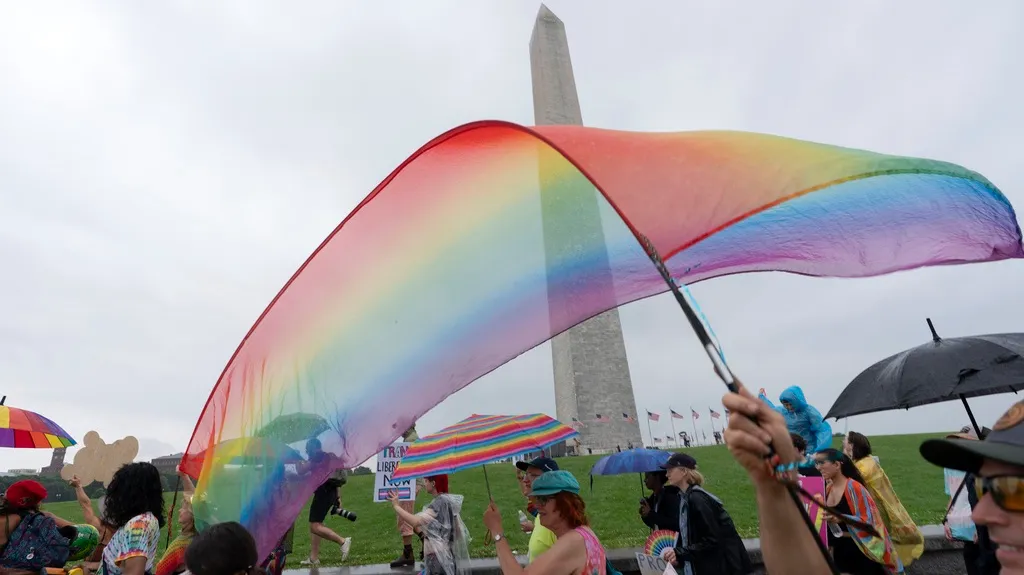December 16, 2014
Qatar's World Cup: Will Gay Fans Be Welcome?
Jason St. Amand READ TIME: 4 MIN.
Cooled, modern stadiums. Fans traveling from the Middle East and beyond, to a region anxious to prove it can put on a show and have its own brand of fun.
All against doubts about whether women, gays and beer-drinkers will feel comfortable.
The 2022 World Cup in Qatar, the wealthy oil- and gas-producing Gulf nation with giant ambitions that belie its size, is shaping up as a unique experience.
As plans jump from architects' tables to lay bricks and mortar on what used to be desert, Qatar officials putting together the first World Cup in the Middle East detailed - in exclusive interviews with The Associated Press - what the fan experience may look like in eight years.
THE SCENE
With the world's third-largest proven reserves of natural gas, Qatar has vast riches to deliver its World Cup bid slogan: "Expect Amazing."
Visitors to Qatar's showcase capital, Doha, will see the toothy skyline rising from what was sand 35 years ago and eye-catching wealth.
At night, the souped-up roars of luxury supercars and racers chasing each other on superbikes reverberate off the futuristic steel-and-glass towers.
Perhaps only in Doha can one see advertisements such as this in a local newspaper: "Urgently wanted: Palace."
STADIUMS
There will be eight to 12 venues, but the exact number hasn't been disclosed yet. Architectural drawings offer a preview of some.
The planned Lusail Stadium in northern Doha, where city ends and desert begins, is earmarked for the opening match and final.
"Without being frivolous with our money, without being extravagant, we are aiming for an architecturally iconic vision" and "a finish and a design that is somewhat groundbreaking," said project manager Tamim el-Abed.
He dropped a hint to expect high-tech, saying fans will soon be able to watch live-action replays on tablets from their stadium seats.
"Future-proofing is very important for us because you see the speed at which technology is developing," he said. "You don't want to design something now that is redundant by time the tournament comes around."
HEAT
Concerns that visitors will wilt in desert heat have been one of Qatar's biggest headaches.
But fans should pack sweaters if, as expected, FIFA moves the tournament to November-December or January-February.
Evenings this November were cool, even chill. Sea breezes made daytime heat feel less fierce. But dust from the desert and construction tickled throats.
If FIFA moves the tournament from June-July, Qatar still plans to air-condition World Cup sites, as promised in its bid.
"Stations will be cooled, fan zones will be cooled, queuing lines and the last mile (kilometer and a half) before a venue will be cooled," el-Abed said.
Power will come from solar energy, with a 100-megawatt solar-plant by 2017, said Dario Cadavid, the point-man on cooling technology.
On-pitch temperatures should hover around 26 degrees Celsius (79 degrees Fahrenheit) and never exceed 28 degrees (83 degrees), unlike the sometimes "suffocating" humidity and heat at this year's World Cup in Brazil, he said.
MIDEAST MOJO
Qatar officials say 2 billion people live within a four-hour flight radius of Doha.
This could give a very Middle Eastern feel to the tournament held 10 times out of 20 in Europe.
Cairo, Tehran, Baghdad and Beirut are no more than three hours flight-time away; Istanbul is four hours; Gulf neighbors just a hop away; the Saudi Arabian capital, Riyadh, is a six-hour drive.
"You will be greeted by Qataris, along with Lebanese, Tunisians, Moroccans, Jordanians, Iraqis, Saudis, Kuwaitis," said Mushtaq al-Waeli, executive director of a Qatari institute, Josoor, giving sports-event training to people from the Middle East and North Africa.
Middle Easterners look to 2022 to show that their region isn't solely defined by Israeli-Palestinian conflict, frequent violence and oil and gas.
"We need to break down those perceptions about what we are," said Hassan al-Thawadi, Qatar's chief World Cup organizer. "Even if it means chipping down just one layer of prejudice and you've got a thousand layers behind it, that's one layer less."
FUN
Doha is no Rio de Janeiro, the Brazilian party city that swayed to samba, football and booze at the 2014 World Cup.
Alcohol is sold to Doha visitors only in posh hotels and they must show passports.
"Qatari ladies are not allowed to enter the bar at any time," says the sign in one Doha hotel.
"Alcohol will be available in certain areas and other areas it won't be available. Alcohol is not part of our religion, it's not part of our tradition," said al-Thawadi.
Fans "won't be able to walk around the streets or walk around the corner and buy, you know, a pint. That's not how we are. But they'll find places."
Doha resident Regard Aboo Yakou, manager of Qatar operations for construction management firm Hill International, doesn't expect much of a party.
"There is nothing to do," he said. "Football fans like to drink, raise hell, party in the streets and take their clothes off and whatever. They won't be able to do that here."
WOMEN, GAYS
Visiting women need not cover up almost completely like Qataris and there's no formal dress code for them.
"You just need to dress appropriately," said Deepa Puvanik, an Indian woman who wore jeans and a shawl to a football match in November where Qatar beat North Korea.
"Of course, to come here in a bikini is not acceptable," she said.
How welcomed gay visitors will be isn't clear.
The Qatari sports minister, Salah bin Ghanem bin Nasser al-Ali, said in an AP interview this question is still being looked at.
Bin Ghanem didn't provide specifics but said
"We are studying all these issues. We can adapt, we can be creative to have people coming and enjoying the games without losing the essence of our culture and respecting the preference of the people coming here. I think there is a lot we can do."






